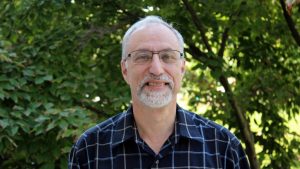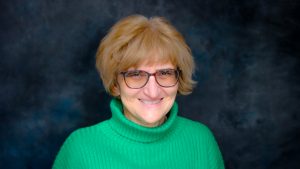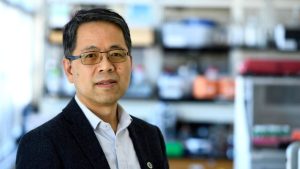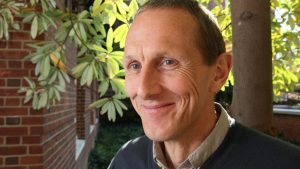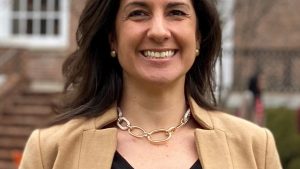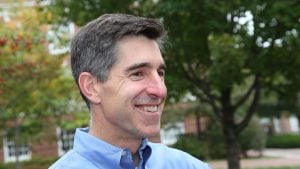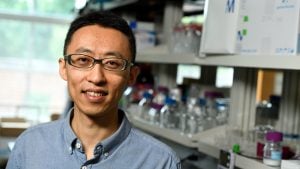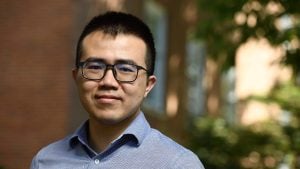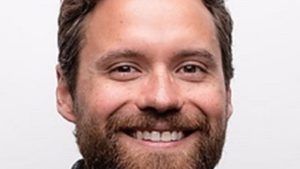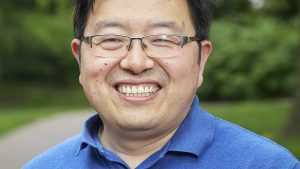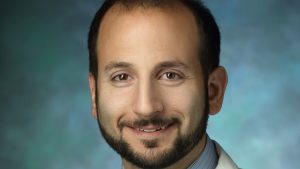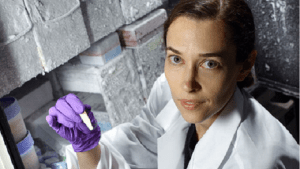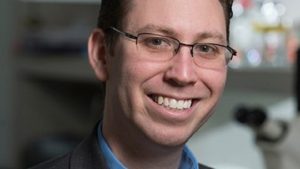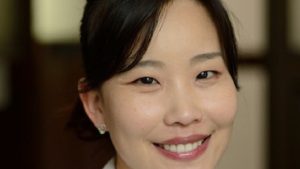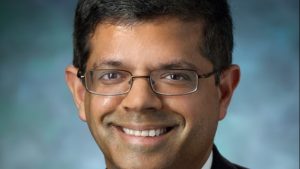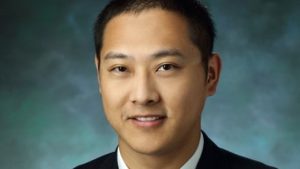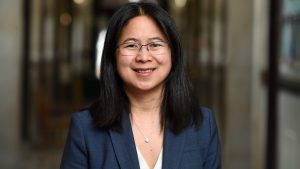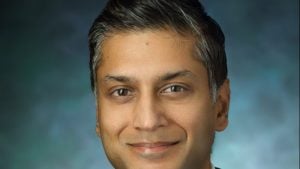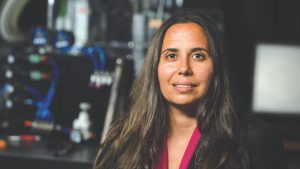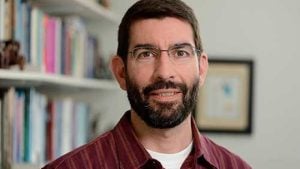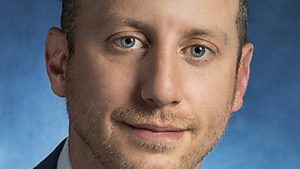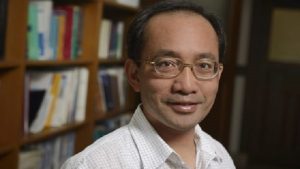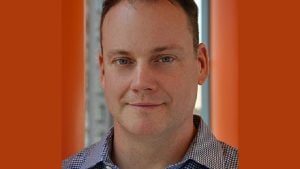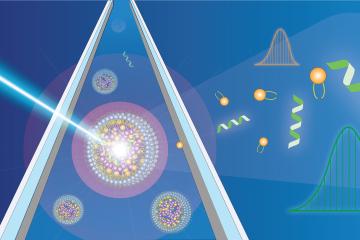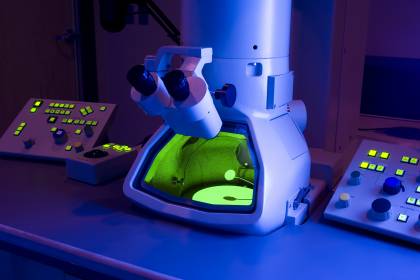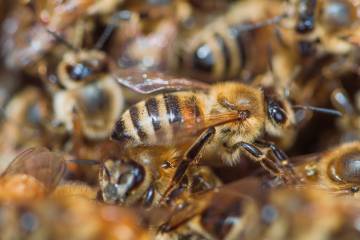The Biomaterials Track in the Materials Science and Engineering Ph.D. Program at Johns Hopkins provides interdisciplinary training in cutting-edge biomaterials research. Working with faculty advisors across the campus, students enrolled in the Biomaterials Track engage in research on creating new biomaterials and technologies for a wide range of applications including cell and tissue engineering, biomechanics and tissue/disease modeling, biodegradable implant materials, neuroengineering, therapeutic delivery, cell membrane signaling, immunoengineering, and disease detection and monitoring, and discover new knowledge in understanding the structure-properties-function relationships governing biomaterials performance and applications.
Students enrolled in the Biomaterials Track work alongside teams of scientists, engineers, and clinicians, who come from the Whiting School of Engineering, Krieger School of Arts and Sciences, School of Medicine, and the Bloomberg School of Public Health, and multidisciplinary research institutes and centers, including the Johns Hopkins Institute for NanoBioTechnology (INBT), Translational Tissue Engineering Center (TTEC), Institute for Cell Engineering (ICE), Hopkins Extreme Materials Institute (HEMI), and Materials Characterization and Processing (MCP) Facility, and to develop biomaterials-based engineering innovations that address critical needs and transform medicine.
Core Faculty
-

Howard Katz, Ph.D.
Professor, Department of Materials Science and Engineering | Department of Chemistry | Research interests: Biomaterials self-assembly and electronics, biosensors
-

Kalina Hristova, Ph.D.
Professor, Department of Materials Science and Engineering | Department of Biomedical Engineering | INBT | Research interests: Cell membrane signaling, drug and gene delivery
-

Hai-Quan Mao, Ph.D.
Professor, Department of Materials Science and Engineering | Department of Biomedical Engineering | INBT | TTEC | Research interest: Therapeutic delivery, cell programming, immunoengineering, regenerative engineering
-

Peter Searson, Ph.D.
Professor, Department of Materials Science and Engineering | Department of Biomedical Engineering | INBT | Research Interest: tissue engineering; vascular engineering; blood-brain barrier; tumor-vessel microenvironment
-

Mitra Taheri, Ph.D.
Professor, Department of Materials Science and Engineering | MURI | MCP | HEMI | Research Interests: in-situ electron microscopy; computational materials; tissue biomechanics
-

Timothy Weihs, Ph.D.
Professor, Department of Materials Science and Engineering | HEMI | Research Interests: Biodegradable implant materials for bone scaffolds, bone fixation, and bile duct stents
-

Luo Gu, Ph.D.
Assistant Professor, Department of Materials Science and Engineering | INBT | Research Interests: Cell and tissue engineering, immunoengineering, tissue modeling, neuroengineering
-

Dingchang Lin, Ph.D.
Assistant Professor, Department of Materials Science and Engineering | INBT | Center for Cell Dynamics | Research Interests: Biosensing, neuroengineering, genetically encoded molecular tools, protein engineering
Associated Faculty
-

Netz Arroyo, Ph.D.
Assistant Professor, Department of Pharmacology and Molecular Sciences | Department of Materials Science and Engineering | INBT | Chemical and Biomolecular Engineering | Biochemistry | Cellular and Molecular Biology | CBI | Research Interests: Electrochemistry, aptamers, in vivo biosensors, continuous molecular monitoring, drug disposition
-

Honggang Cui, Ph.D.
Associate Professor, Department of Chemical and Biomolecular Engineering | Department of Materials Science and Engineering | Department of Oncology | INBT | Research Interests: Supramolecular biomaterials, supramolecular polymers, drug delivery, immunotherapy, long-acting injectables
-

Joshua C. Doloff, Ph.D.
Assistant Professor, Department of Biomedical Engineering | Department of Materials Science and Engineering | Department of Oncology | INBT | SKCCC | BKI | Research Interests: biomaterial implant/transplant rejection, autoimmune and inflammatory disorders (e.g., T1D), fibrosis, cancer, & ophthalmology
-

Jennifer Elisseeff, Ph.D.
Professor, Department of Biomedical Engineering | Department of Materials Science and Engineering | TTEC | Department of Orthopedic Surgery | Research Interests: Regenerative immunology, senescence and the immune system, clinical translation in regenerative medicine, biomaterials and stem cells
-

Warren Grayson, Ph.D.
Professor, Department of Biomedical Engineering | Department of Materials Science and Engineering | Department of Biomedical Engineering | Department of Chemical & Biomolecular Engineering | INBT | Research Interests: Stem cell sources for tissue regeneration, perfusion bioreactors for engineering large tissue grafts, bioactive scaffolds for bone regeneration
-

Jordan Green, Ph.D.
Professor, Department of Biomedical Engineering | Department of Materials Science and Engineering | Oncology | Ophthalmology | Neurosurgery | Chemical & Biomolecular Engineering | TTEC | INBT | JH-TIE | BKI | SKCCC | Research Interests: Cell engineering and cell therapy; immunoengineering; polymeric libraries for gene delivery
-

Soojung Claire Hur, Ph.D.
Assistant Professor, Department of Mechanical Engineering | HEMI | Departments of Oncology | Department of Materials Science and Engineering | INBT | Research Interests: Microfluidics, Biophysics, Electroporation, Nonlinear fluid dynamics
-

Rangaramanujam Kannan, Ph.D.
Professor, Department of Ophthalmology | Department of Materials Science and Engineering | WEI | KKI | Research Interests: Targeted drug delivery, dendrimer nanomedicine, translational research, CNS and ocular disorders
-

Xiaobo Mao, Ph.D.
Associate Professor, Institute for Cell Engineering | Department of Materials Science and Engineering | Department of Neurology | INBT | Research Interests: Nanomaterials; neurodegenerative disease; prion-like protein aggregation, strain, and propagation; Parkinson’s disease; Alzheimer’s disease
-

Thao (Vicky) Nguyen, Ph.D.
Associate Professor, Department of Mechanical Engineering | Department of Materials Science and Engineering | Department of Ophthalmology | HEMI | INBT | Research Interests: Cardiovascular and ocular tissue biomechanics, collagen growth and remodeling, soft active materials for biomedical applications
-

Sashank Reddy, M.D., Ph.D.
Associate Professor, Department of Plastic and Reconstructive Surgery | Department of Materials Science and Engineering | Department of Biomedical Engineering | INBT | Research Interests: Eukaryotic cell cycles; mechanisms governing homeostasis and renewal in skin; tissue restoration and cell delivery
-

Rebecca Schulman, Ph.D.
Associate Professor, Department of Chemical and Biomolecular Engineering | Department of Chemistry | Department of Computer Science | INBT | HEMI | CBIP | Center for Cell Dynamics | Research Interests: intelligent and adaptive biomolecular materials; self-assembled nanostructures; DNA nanotechnology; synthetic biology
-

John Tovar, Ph.D.
Professor, Department of Chemistry | Department of Materials Science and Engineering | Research Interests: thiophene-based polycyclic aromatics, self-assembling biomaterials, organic nanostructures, chemisorbtion
-

Sami Tuffaha, Ph.D.
Assistant Professor, Department of Plastic and Reconstructive Surgery | Department of Neurosurgery | Department of Materials Science and Engineering | INBT | Research Interests: Peripheral nerve regeneration; neuropathic pain; biomaterials; tissue engineering; nerve imaging
-

Tza-Huei (Jeff) Wang, Ph.D.
Professor, Department of Mechanical Engineering | Department of Materials Science and Engineering | Biomedical Engineering | Oncology | Infectious Disease Division | Research Interests: Micro/Nano Technologies, Microfluidics, Biosensors, Fluorescence Spectroscopy, Molecular Assays and Diagnostics, Epigenetic analysis of cancer
-

Denis Wirtz, Ph.D.
Assistant Professor, Department of Chemical and Biomolecular Engineering | Departments of Materials Science and Engineering | Biomedical Engineering | Pathology | Oncology | SKCCC | INBT | Research Interests: 3D AI-based imaging (CODA); immuno-engineering; Cancer cell engineering (antibody-based therapies); multi-compartment organoids
-

Scott Wilson, Ph.D.
Assistant Professor, Department of Biomedical Engineering | TTEC | Research Interests: Biomaterials, immunoengineering, drug delivery
Biomaterials Research Topics
Biomaterials for tissue engineering |
Biodegradable materials and implants |
Biomechanics and tissue/disease modeling |
Biomaterials for neuroengineering |
Biomaterials for cell programming |
Biomaterials for drug delivery and cell membrane signaling |
Biomaterials for gene therapy and gene editing |
Biomaterials for immunoengineering |
Biomaterials for disease detection and monitoring, biosensing |
Biomaterials self-assembly and additive manufacturing |
VIVIEN THOMAS PHD SCHOLARS
The Vivien Thomas Scholars Initiative (VTSI) is an endowed fellowship program at Johns Hopkins for PhD students in STEM fields. It provides full tuition, stipend, and benefits while also providing targeted mentoring, networking, community, and professional development opportunities. Students who have attended eligible institutions, including historically Black colleges and universities (HBCUs), community colleges, and regional institutions in Maryland, Virginia, and the District of Columbia for undergraduate study, are eligible to apply. More information about the VTSI program is available at this link: https://provost.jhu.edu/about/vivien-thomas-scholars-initiative/.
To be considered for the VTSI, all components of the PhD program application, including the VTSI supplemental components, must be completed by December 1, 2025. All supplementary application material, including letters of recommendation, must also be received by December 1.
